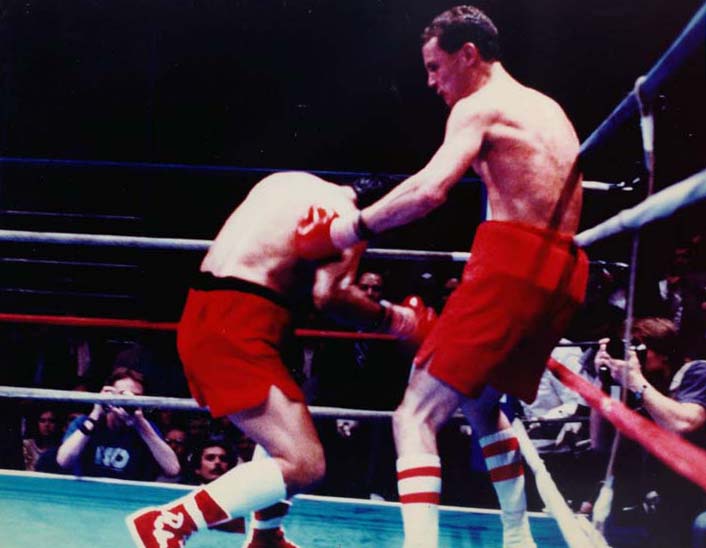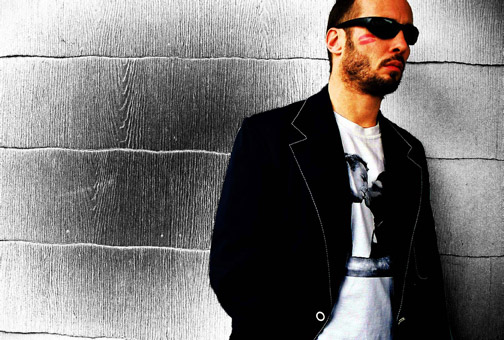February 2006
Rinsing Off the Mouthpiece
By GorDoom
Poem of the Month
By Tom Smario
The 2005 CBZ Year-End Awards
By J.D. Vena
Women to Watch For in 2006
By Adam
Pollack
INTERVIEWS:
Lou DiBella: No Joe Palooka
By Dave Iamaele
Lamon Brewster, Unplugged
By Juan C.
Ayllon
Touching Gloves with...
Clyde Gray
By Dan
Hanley
PROFILES:
Iron Mike Tyson: Myth or Monster?
By
Jim Trunzo
Jess Sandoval: The Coach Says,
"Bundle Up"
By
Katherine Dunn
The Legend of the Cuban Baron,
Ramon Castillo
By Enrique Encinsoa
Paul Thorn
By Pete Ehrman
Battling Nelson: Always Battered,
Seldom Beaten
By Tracy Callis
Kid Chocolate,
the Cuban Bon Bon
By Monte Cox
BOOK REVIEWS AND EXCERPTS:
Shadow Boxers
Photographs by Jim
Lommasson
The Iceman Diaries
by John Scully
The Boxing Bookshelf
by Dave Iamele
|

Paul Thorn
By Pete Ehrmann
I climbed in the ring with Roberto Duran and the punches began to rain down. He hit me
with a dozen hard uppercuts and my corner threw in the towel. I asked him why he had to
knock me out, and he summed it up real well. He said, "I'd rather be a hammer than a
nail."
-- From "I'd Rather Be a Hammer than a Nail," copyright Paul Thorn, Billy Maddox, Yo Man
Music-BMI, Illegal Songs, Inc., BMI
There are two things you shouldn't do to Paul Thorn.
One is to wander onto the stage when the songwriter and recording artist -- hailed by
music critics as the freshest version of Bob Dylan, Kinky Friedman, and John Prine -- is
performing, yank the microphone away from him and start belting out Elvis tunes. A fool
actually did that at a club in Thorn's hometown of Tupelo, Mississippi, and quickly found
out why, the above verse notwithstanding, it was no mismatch when Thorn swapped punches
with the legendary "Hands of Stone."
"Even though I'm shot, I can still crack a left hook off somebody's head," says the
40-year-old Thorn to describe what happened to the interloper.
The other thing you don't do is react to the name of the four-time world champion from
Panama by rolling your eyes and chirping "No mas! No mas!" in mockery of Duran's surrender
to Sugar Ray Leonard in their 1981 welterweight title bout.
"It pisses me off more than anything," Thorn said during a recent stop at Shank Hall in
Milwaukee to perform and promote his latest CD for Back Porch Records, Are You With
Me?
"People want to remember your failures, not your accomplishments. They focus on the
blemishes. I tell them, 'How 'bout you shut your mouth, because you don't know anything
about Roberto Duran.'"
If his rising musical star reaches the heights projected for it by a growing number of
critics and fans, the achievement won't be any more lustrous to Thorn than the memory of
being in the opposite corner for the 91st fight in the career of the onetime lightweight,
welterweight, junior-middleweight, and middleweight champion, whose talent in the ring
Thorn regards as a "gift from God."
While Thorn wasn't equally blessed in that respect, the Almighty has been a major
influence in his life thanks to the Rev. Wayne Thorn, Paul's father, a Church of God
minister who had him playing tambourine and singing at revival meetings when he was just
3, and strictly forbade him from attending dances, playing rock & roll, and even going
swimming in coed settings to keep secular temptation at bay.
No wonder, then, that the arrival in Tupelo of Merle Thorn, Paul's uncle, was a seismic
development in the life of the 12-year-old who "had never been out in the world much." In
California, Merle had been a boxer, and his stories about sparring with world champions
Danny "Little Red" Lopez and Bobby Chacon enthralled his nephew. Pretty soon a heavy bag
was hanging from a tree in the Thorn yard.
"I won my first amateur fight by KO," said Thorn, "and I kinda got the bug."
In 1985 Thorn started what he hoped would be a march to ring glory by knocking out George
Reedy in two rounds in his first pro fight. He had the dedication and that cracking left
hook, but basic geography proved a major stumbling block.
"I was like a lot of fighters who live in out-of-the-way towns with no facilities, no
quality sparring, and nothing except the desire to become a boxer," he said. "You become a
hero in the little town you live in, but even if you have talent, it's difficult."
Nevertheless, beating Knox Brown in 12 rounds in Memphis for the Mid-South middleweight
title on November 3, 1987, put Thorn at No. 9 in the hit parade of the North American
Boxing Federation. It wasn't long after that when Uncle Merle, his trainer and cornerman,
stopped by the trailer Thorn lived in at the time and opened a conversation about his next
opponent by asking, "Remember out in the backyard when you were always pretending to be
Roberto Duran?"
So off to Atlantic City they went to face, on April 14, 1988, the man whose posters from
KO Magazine still adorned the walls of Thorn's bedroom.
Duran, 36, was climbing the last peak of his remarkable career. Eights months later he
would dethrone Iran Barkley for the WBC 160-pound title. So Duran was far from in his
boxing dotage when Uncle Merle sent his nephew out against him with the advice to lay back
and let Duran do all the leading.
It was a solid fight plan, but two things wrecked it: Duran was too smart to cooperate,
and after a tame opening round, says Thorn, "my ego got involved and I started moving
forward and mixed it up with him." Duran knocked him down in the second, and in the
process cut Thorn's upper lip almost to his nose.
"I'd always heard about those Hands of Stone, and he did hit hard. But what impressed me
was how impossible he was to hit and his ability to make me miss and then counter. It was
unbelievable. He was like a magician."
Yet, according to the New York Post's Mark Di Ionno, Thorn "won over the crowd of
1,865 at the Tropicana by outboxing the used-up three-time world champ." He cut Duran over
his left eye but was bleeding so badly himself from the torn lip and cuts over both his
eyes that Uncle Merle threw in the towel before the bell for round seven of the USA
Network's Tuesday Night Fights main-event.
"I couldn't have lost to a greater fighter," Thorn said. "It's thrilling as the years go
by that I was in there with him. Even if I'd stuck to a perfect fight plan, he'd probably
have won anyway because he was Roberto Duran."
For all that, the opponent responsible for making Paul Thorn who he is today was a
journeyman named Johnny Gutierrez, who later that year subjected him to "the worst
experience I ever had in boxing."
Forced to come in at 147 pounds, Thorn was so weak that Gutierrez "just punched holes in
me," until their fight was stopped in the seventh round.
"There's always one fight in every fighter's career that takes everything away," Thorn
said. "It was the Johnny Gutierrez fight."
After struggling to beat well-traveled Buck Smith, the 14-4 Thorn came to the realization
that he could easily end up like his best friend and hero Jimmy Heair, a 1970s lightweight
contender from Memphis whose souvenirs today of over 150 pro fights are halting speech and
a stumbling gait.
"I was never a top-level fighter. At best, I was a little better than a club fighter,"
Thorn said. "Maybe I would've kept on trying to fight and just wound up an opponent. I
wouldn't stay in there and make a few hundred bucks just to get beat up."
Unlike Heair and so many other boxers with nothing to keep them from coming back for one
more fight, he had a fallback passion instilled by all those revival meetings he sang at
as a boy: "an unbelievable rich musical training ground."
Working in a furniture factory in the daytime, by night he played his guitar and sang his
own rock & roll and blues compositions in Tupelo pizza parlors. After he was seen by a
representative of Miles Copeland, manager of Sting and the Police, Thorn not only attended
his very first music concert but opened the show for Sting before 13,000 in Nashville.
It was another quantum leap, but unlike the one that landed him in that Atlantic City
ring, this one was no sweat. When it comes to inducing gut-churning fear, Thorn says the
ring lights have it all over the footlights.
 "Boxing and singing in front of people are two different things entirely," Thorn says. "There's no
comparison to boxing. I've jumped out of an airplane 167 times, but I was never so scared
as when I was sitting in a dressing room with my hands taped and the guy called out 'It's
time!' It's like going to an execution, because you're walking to meet someone who you
know in advance is trying to whip you. That's pretty scary."
"Boxing and singing in front of people are two different things entirely," Thorn says. "There's no
comparison to boxing. I've jumped out of an airplane 167 times, but I was never so scared
as when I was sitting in a dressing room with my hands taped and the guy called out 'It's
time!' It's like going to an execution, because you're walking to meet someone who you
know in advance is trying to whip you. That's pretty scary."
Unless, of course, you're a wild man from the streets of Panama City to whom fighting is
as natural as breathing.
"One thing I learned boxing is that it's only partly physical," Thorn said. "The biggest
part of being good at boxing is mental. When Roberto Duran went in that ring, he was
completely relaxed. I, on the other hand, was crappin' in my pants."
Since 1997 Thorn has cut five CDs, each in its turn better received than the one before,
toured all over the world with Prine, Mark Knopfler, and Toby Keith, and heÕs done a
growing number of headline dates of his own. His songs have been covered by Keith, Sawyer
Brown, and other major artists, and used in several movie soundtracks. Last year, Sir Paul
McCartney chose one of Thorn's songs to include on a CD the ex-Beatle is producing to
raise funds for breast-cancer research.
Thorn's 2003 compilation Mission Temple Fireworks Stand was ranked among the best
CDs of that year by many reviewers. Its cover picture was drawn by Thorn himself. He's
also an artist of growing renown, with four gallery showings of his work so far. (Thorn's
music, artwork, and even highlights of his boxing career can be viewed on his Web site,
paulthorn.com.)
While his boxing days are behind him for good, Thorn still has unfinished business with
the biggest name on his ring record. He wants a return engagement with Duran -- this time
in the recording studio.
The title track of Thorn's first CD, "Hammer and Nail," contains the verse quoted at the
outset of this piece about his fight with the Panamanian great. The plan was to have Duran
himself play the congas on the record, but Duran was training to fight Hector Camacho Sr.
then and it didn't work out.
But Thorn has no intention of saying "No mas!" nor any more palatable version thereof, to
his dream of trading licks with the best fighter to ever lick him.
"I will seek him out," he vowed, "and we will jam."
Contact Pete Ehrmann at
editors@cyberboxingzone.com.
> contents
<
|

